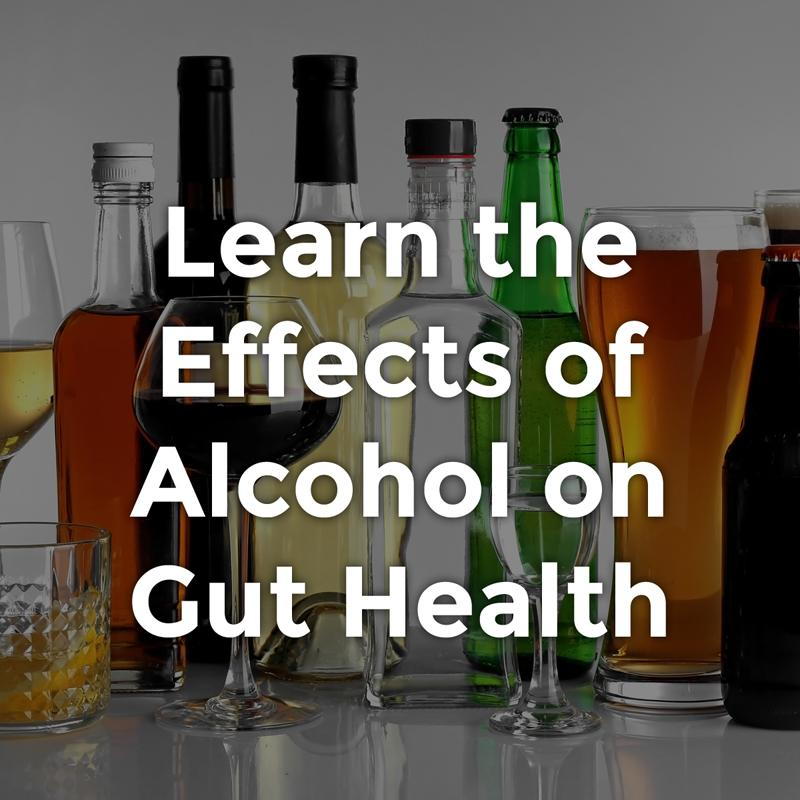The Truth: How does Alcohol affect Your Digestive Health?
posted: Oct. 23, 2018.
Have you noticed how other people love to refill your glass at parties? Often when you still have half your drink left! Alcohol can be a great social lubricant. But many of my patients come to me with concerns, asking how many drinks are allowed, and if they're still permitted that small glass of wine with dinner at the weekend.
While there is no one-size-fits-all solution for you or my patients, I feel that it’s important to lay out the facts on alcohol and your gut, to help you consider the advantages and disadvantages. Ultimately, your body’s digestive system is not designed to process large amounts of alcohol. Alcohol consumption is of particular concern to me as a GI doctor, because it affects so many areas of the gastrointestinal tract. I think it's an excellent idea to educate yourself, and make the choice that's right for you.

How Do We Digest Alcohol?
When you drink an alcoholic drink, it initially passes down into your stomach, which contains alcohol dehydrogenase (ADH), your body's main line of defense against alcohol molecules. How effectively you metabolize alcohol is dependent on age, gender, and ethnicity. Most of your ADH resides in your liver, ready to filter and breakdown the alcohol that makes it to your bloodstream.
Alcohol molecules are very small, so, when they hit your small intestine, they can easily pass through your gut wall and into your bloodstream, quickly creating that relaxed effect enjoyed after a glass of wine – the alcohol does indeed go straight to your head! Drinks containing carbonated bubbles are metabolized much quicker. On an empty stomach, the alcohol meets even less resistance from the gut. So it’s true: drinking after a meal can slow down the rate of absorption.
While your stomach can breakdown some alcohol molecules, a small amount of alcohol is excreted directly through your urine, breath, and sweat. But the ADH in your liver is responsible for neutralizing the majority of the alcohol you consume. On average, it takes 1 hour for your body to break down one alcoholic drink. But this is not a hard and fast rule – often it can take hours for your liver to metabolize one drink. The size of one standard drink corresponds to:
- 12-ounce bottle of 5% beer
- 5-ounce of 12% wine
- 1.5-ounce of 80% liquor
Alcohol can cause heartburn, by provoking your stomach into attacking its own lining and surrounding muscles. Drinking large quantities can also cause nausea, vomiting, and ulcers, and go on to trigger further damage in your gut. Let's dive into the details, so you can make an educated decision about your alcohol consumption, even if you're not currently experiencing any gastrointestinal effects.
Drinking alcohol harms your gut microbiome – this stands to reason because alcohol or ethanol is used as a disinfectant, and your microbiome is made up of important bacteria! The only alcoholic drink that can improve your gut microbiome is red wine (consumed in moderation) because it contains polyphenols, which increase your ‘good’ bacteria.
Just as heartburn is an inflammatory reaction to alcoholic drinks in the stomach, alcohol can also worsen symptoms of IBS. In fact, binge drinking can create a similar reaction in non-IBS patients causing symptoms such as:
- Diarrhea
- Abdominal pain
- Bloated feeling
- Flatulence
You may be surprised to learn that alcohol inhibits your gut’s ability to absorb crucial nutrients and proteins. Drinking large quantities of alcohol regularly reduces the number of digestive enzymes your pancreas can release into your digestive tract. These enzymes are needed to oxidize the alcohol, to break it down into energy and components that eventually passes from your body. But the enzymes are also crucial to the proper digestion of food. Without them, you lack the ability to take up the vitamins and minerals needed for different functions in your body.
Because alcohol causes an inflammatory response in your gut, it can lead to intestinal inflammation. And, in alcoholics, it can affect the intestinal permeability, potentially letting toxins and other debris through the gut wall and into the bloodstream. These conditions can create serious discomfort and pain for the sufferer.
The Risk of Colon Cancer
In 2012, the International Agency for Research on Cancer evaluated ethanol in alcoholic beverages as a group 1 carcinogen. While drinking alcohol is well known as a cause of cancer of the liver and breast, in terms of your digestive system, heavy alcohol consumption can raise the risk for cancer of the mouth, throat, and bowel - both colon and rectum.
When you drink, the alcohol makes direct contact with the epithelial surface of your mouth and throat. More than four drinks a day seriously raises your chances of getting a gastrointestinal cancer.
Many of my patients ask me about colon cancer at their appointment. You may know someone who had or has colon cancer, as it is the third most common type of cancer in the United States.
Colon cancer symptoms can include*:
- Bleeding from the rectum
- Blood in your stool
- Abdominal cramps
- Pain from gas
- A change in your bowel habits
- A change in consistency of your stool
*However, in the early stages colon cancer can be asymptomatic.
In the moderate drinker demographic, men are at slightly higher risk than women. Men and women break down alcohol differently, due to hormonal differences.
With this information in mind, I believe that if you enjoy the occasional alcoholic drink – preferably after a hearty meal – then you are not putting yourself at a huge risk. However, there is certainly an increased danger to your digestive system and gut if you choose to regularly drink heavily. Binge drinking or drinking every day can put an added strain on your body, but the occasional celebratory drink is not a cause for concern.
If you're concerned about the health of your gut, or would like to schedule a colonoscopy in the Dallas/Plano TX area, please fill out our appointment form or call us at 972-867-0019.




